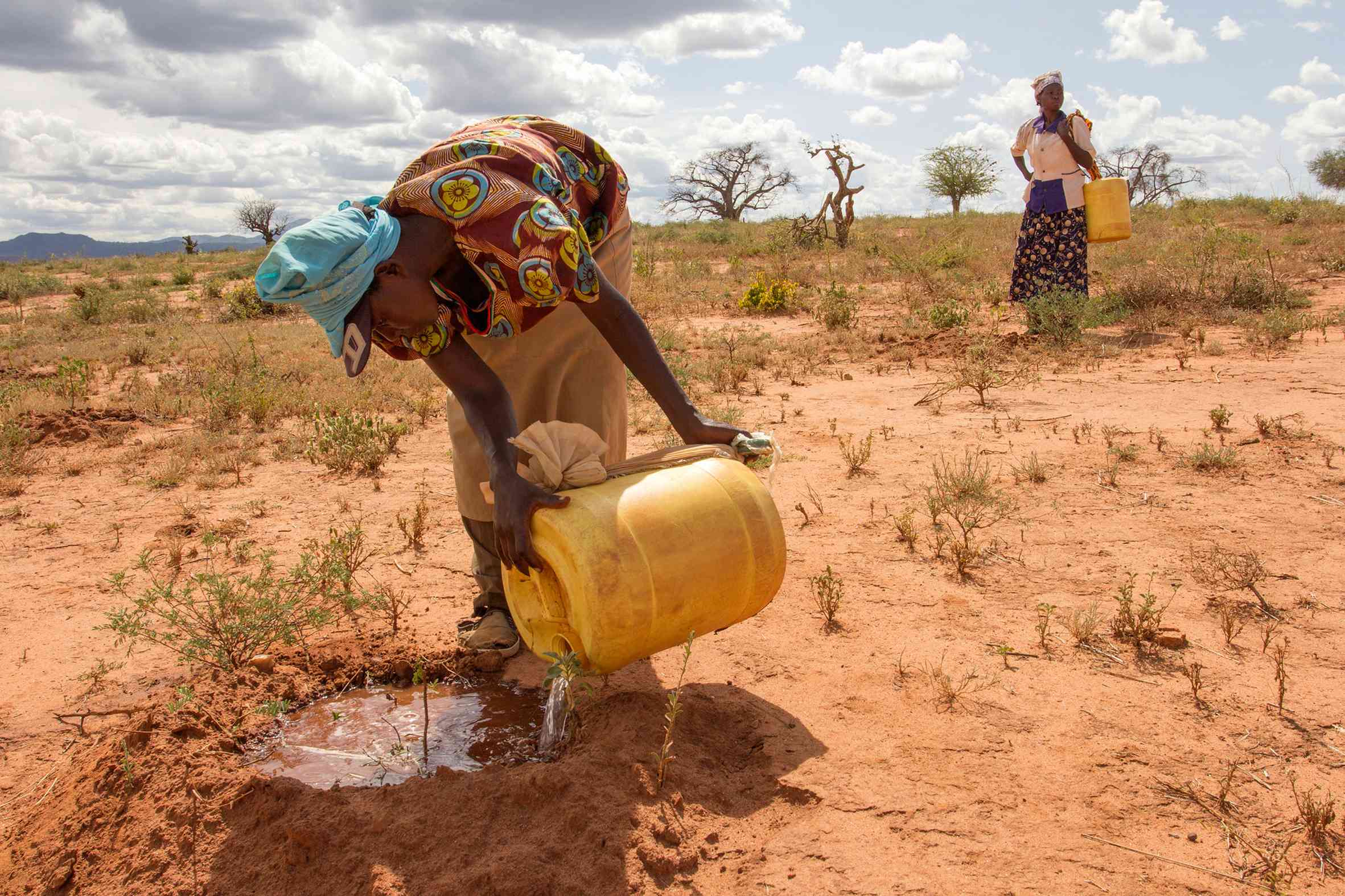
Climate change impacts men and women differently, with women being more vulnerable than men.
Climate change is threatening our planet’s sustainability with devastating social, cultural, economic, health and human rights impacts, affecting women and girls disproportionately especially the most marginalised groups. It is also a serious aggravator of the different forms of Violence Against Women and Girls (VAWG) . The shadow pandemic of VAWG during COVID-19 exemplified the surge of violence that occurs during crises and disasters.
In terms of empowerment women may also be well positioned to lead adaptation efforts alongside men.
Women being more vulnerable both in short-term i.e., major natural disasters, cyclones, flood, and long-term i.e., soil, land erosion, droughts, climatic events, as they enhance gender inequalities. Further, gender inequality is seen in illiteracy, food shortages and poor health conditions, traditional norms, religious taboos, and patriarchy. Moreover, gender-based economic opportunities, women’s mobility, and income are changing, while household authority relations and gender-based socio-economic, cultural, and institutional constraints remain.
On a superficial level, climate change does not seem to have an impact on gender elements. However, changing environmental conditions continue to alter the impact on women. Women, adolescent girls, and female children are the most abandoned during natural catastrophes.
The increased vulnerability of women to climate change can only be mitigated through trauma informed, environmentally friendly women empowerment initiatives that seek uncouple the root causes of climate change namely:
- Patriarchy
- Capitalism
- Colonialism
Patriarchy is a social and ideological construct which considers men (who are the patriarchs) as superior to women. Patriarchy imposes masculinity and femininity character stereotypes in society which strengthen the iniquitous power relations between men and women. Overcoming the belief and practice patriarchal control, exploitation, and oppression at the material and ideological levels of women's labour, fertility and sexuality, in the family, at the place of work, and in the society in general is the dawn of true and sustainable community or national empowerment.
The empowerment of women at the workplace and at home seems to have a spillover effect as both moderate the relation of empowerment and general well-being of the society. Deep level impact on social transformation will take place only when the concept of patriarchy is shaken and conditions supporting trauma informed empowerment are created for women to experience sound and sustainable psychological empowerment.
- Young entrepreneur dreams big
- Chibuku NeShamwari holds onto ethos of culture
- Health talk: Be wary of measles, its a deadly disease
- Macheso, Dhewa inspired me: Chinembiri
Keep Reading
The purpose of human existence, as set by capitalism, is to maximise profit. In essence, the everyday person is to make money to yield financial gains and ultimately make the rich richer. Using this framework, it is important to understand that what society considers “normal” are tools of oppression. We see how essential items — housing, food, electricity and water — are commodified. There are also other human needs that are exploited. Female identity is a money-making machine. In particular, the construction of women’s gender expression has been manufactured for profit and is upheld by capitalism’s patriarchal logic.
The patriarchy seeks to uphold male supremacy socially and economically, and within the private and public spheres. The patriarchy is a foundational tool of capitalism. Therefore it is essential to analyse how capitalism perceives gender and responds to it to understand it as a tool of exploitation.
Historically, European colonisation has accelerated this trend as the colonisers violently reacted to countries that differed from
Both state feminists and liberal feminists often ignore the complex intertwined history of capitalism, patriarchy and colonization, and suggest that women can be empowered through economic participation. A common joke from these feminisms is the term “Girl Boss,” which portrays women as liberated as long as they have the same opportunities as men.
But this narrative is misguided. By encouraging participation of women economically, the capitalist system makes workers believe they can obtain power and influence. The everyday woman, with the same opportunities as men, now thinks that she has free will and a choice in society. But giving women the same opportunities as men alone will not allow for liberation.
An oppressed group cannot work within the system that is oppressing them and obtain autonomy when this system fundamentally oppresses these groups to ensure its own success. These systems — capitalism and the patriarchy — must be entirely dismantled for any progress to occur, and for women to be truly liberated.
The gendered market is one capitalist tool that benefits men and oppresses women. This market creates an impossible standard of female beauty and a threat of violence if it is not achieved. This is where the social discrimination against women meets the economic oppression of women. As a result, women are constantly chasing and changing to fulfill a visual aesthetic that changes frequently to create demand and ultimately profit the rich. These standards are defined by men and tailored to their sexual and aesthetic benefits and desires.
Capitalism is so successful in its exploitation and control of gender that the majority are not aware that their bodies are being used as a political tool to gain capital and increase profits for the one percent. The way this works is through the market “empowerment” tactic where individuals believe that they have autonomy over their bodies and choices. Capitalism presses the narrative that if you work hard, you deserve to buy nice things.
Consumerism is a prime example of this veil, encouraging women to dress and consume products that make them feel good about their body. This is pressed by the patriarchy, which demands that women are visually objects to be consumed by men. In this manner, a woman’s worth is associated with how attractive she is, by the standards of men; therefore, her gender expression is constantly scrutinised.
The male gaze influences the way women “choose” to create their appearance. Women are told they can be liberated by expressing themselves through what they adorn their body with. But consumerism thrives as these products become more trendy and more in demand for women to convey their sexuality, personality and gender.
The rich get richer and the poor are further exploited as consumerism thrives. The factories in which these lavish and beautiful items are being produced are directly abusing women who are laboring to make these items in what would be “developing nations” from the standard of Western supremacy. The women in these factories work in order to survive, under the threat of violence. The responsibility is shifted from the exploiters to the masses as these women are hurt by imperialism and globalization.
We cannot think about liberating marginalised bodies without dismantling the systems that oppress them. These systems, the patriarchy and capitalism, work hand-in-hand to benefit each other and profit from the women they control. There is no possible way to actively oppose these systems while contributing to them — the body in its participatory form is inherently political.
On the other note it is prudent to connect climate change to colonisation as it recognizes that historic injustices are not relegated to history, and remain in many ways unresolved unless conscious effort is made to address them. Colonial legacies are alive in the present.
The colonial grabbing of land not only dispossessed people of identity, beliefs, territories and resources, it also altered what were previously sustainable native ecosystems. Addressing the effects of climate change cannot be achieved without also addressing the legacies of colonialism.
- Chikodzi is a social entrepreneur, founder and director of Chartered Institute of Organic Health Trust, chartered customer service professional and member of the Africa Project Against Suicides. These weekly New Perspectives articles, published in the Zimbabwe Independent, are coordinated by Lovemore Kadenge, an independent consultant, managing consultant of Zawale Consultants (Pvt) Ltd, past president of the Zimbabwe Economics Society and past president of the Chartered Governance & Accountancy Institute in Zimbabwe (CGI Zimbabwe). — [email protected] or mobile: +263 772 382 852










